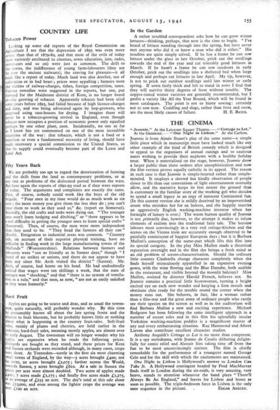THE CINEMA
" Jeannie." At the Leicester Square Theatre.--,, Cottage to Let." At the Gaumont.—" One Night in Lisbon." At the Carlton.
Jeannie is from Aimee Stuart's play of the same name—a simple little piece which in manuscript must have looked much like any other example of the kind of British comedy which is designed to appeal to the organisers of annual outings and to cautious aunts wishing to provide their nephews with a healthy holiday treat. When it materialised on the stage, however, Jeannie drew a larger public than these seekers after unsophistication and now the film version proves equally catholic in its appeal. The reason in each case is that Jeannie is simple-hearted rather than simple- minded. It employs a shrewd but kindly observation of people closer to life than our conventions of light entertainment normally allow, and the narrative keeps its feet nearer the ground than is customary in the familiar story of the working girl who decides to spend a small legacy in an orgy of innocent Continental fun. (In this current version she is mildly deceived by an impoverished count who mistakes her for an heiress, and she happily marries an aggressively English washing-machine inventor when her fortnight of luxury is over.) The warm human quality of Jeannie is not primarily due, however, to the attempt it makes to infuse elements of realism into the traditional fairy tale. The heroine labours most convincingly in a very real cottage-kitchen and the scenes on the Vienna train are accurately enough observed to be painfully reminiscent of happier European days ; but it is Barbara Mullen's conception of the name-part which lifts this film into its special category. In the play Miss Mullen made a theatrical reputation overnight and in the film she brings a fresh mind to an old problem of screen-characterisation. Should the ordinary little country Cinderella change character completely when she finds herself miraculously apparelled in an expensive evening gown, with the wine flowing and the Blue Danube, both audible in the restaurant, and visible beyond the moonlit balcony? Miss Mullen, assisted by director Harold French, believes not. So Jeannie remains a practical little Scotswoman, turning a bright excited eye on each new wonder and keeping a firm mouth and obstinate chin ready for the trouble round the corner when the money runs out. She behaves, in fact, like a woman rather than a film-star and the great army of ordinary people who rarely see their species on the screen as well as in the auditorium will fmd Barbara Mullen a new and exciting experience. Michael Redgrave has been following the same intelligent approach in a number of recent roles and in this film his splendidly insular Yorkshire washing-machine peddler is a magnificent master of any and every embarrassing situation. Kay Hammond and Albert Lieven also contribute excellent character studies.
Anthony Asquith's Cottage to Let is no more than competent. It is a spy melodrama, with Jeanne de Casalis dithering delight- fully for comic relief and Alastair Sim taking time off from the fun to be most unconvincingly sinister. The film is chiefly remarkable for the performance of a youngster named George Cole and for the skill with which the excitements are maintained.
One Night in Lisbon is Hollywood's answer to London Can Take It. A Hollywood contingent headed by Fred MacMurray finds itself in London during the air-raids, is very amusing, very brave, stands to attention whenever the band plays "There'll Always Be An England," and leaves for Lisbon and home as soon as possible. The triple-bedroom farce in Lisbon is the only


























 Previous page
Previous page